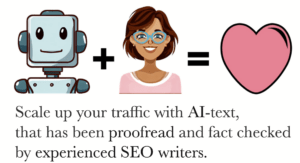In today’s rapidly evolving digital landscape, artificial intelligence (AI) marketing tools are often shrouded in misconceptions and myths that can cloud judgment and hinder effective adoption.
From fears of job displacement to the belief that AI tools are only for tech giants with deep pockets, these misunderstandings can create unnecessary barriers.
In this article, we’ll debunk some of the most common myths surrounding AI marketing tools, clarifying what they can and can’t do, and demonstrating how businesses of all sizes can leverage these technologies to enhance their marketing efforts.
Let’s cut through the noise and get to the truth about AI in marketing.
AI Marketing Tools Misconceptions
Many people harbor misconceptions about AI marketing tools that can lead to missed opportunities and inefficiencies.
You might think AI tools are too complex or only suitable for large corporations with big budgets. However, AI marketing tools are designed to be user-friendly and scalable, fitting various business sizes.
Another common belief is that AI will replace human marketers. In reality, AI enhances your marketing efforts by automating repetitive tasks, allowing you to focus on strategic planning and creativity.
You may also worry about data privacy, but most reputable AI tools comply with stringent data protection regulations.
By understanding and correcting these misconceptions, you can leverage AI marketing tools to optimize your campaigns, improve customer engagement, and ultimately boost your ROI.
Common Misunderstandings About AI
Many misunderstandings about AI stem from myths that cloud its true potential and applicability in marketing.
You might think AI is some mystical, complex technology that’s only accessible to tech giants, but that’s not true. AI tools are becoming increasingly user-friendly and affordable for businesses of all sizes.
Another common misconception is that AI will replace human jobs entirely. In reality, AI is designed to augment human capabilities, not replace them. It can handle repetitive tasks, freeing you to focus on more strategic, creative work.
Lastly, some believe AI requires vast amounts of data to be effective. While more data can improve AI’s accuracy, many AI tools are designed to work efficiently even with smaller datasets.
Debunking AI Tool Efficiency Hype
Many marketers fall for the hype that AI tools can deliver instant, flawless results, but that’s far from the truth.
Sure, AI can streamline processes and offer valuable insights, but it’s not a magic wand. You still need to invest time in setting up, monitoring, and optimizing these tools. They require quality data to function effectively, and even then, human oversight is crucial.
Misinterpretations and errors can still occur, leading to misguided strategies if left unchecked. So, while AI can significantly enhance your marketing efforts, it’s not a set-and-forget solution.
Approach AI tools as a supportive resource that still demands your attention and expertise to drive real, meaningful results.
The Truth About AI’s Limitations
Despite its many advantages, AI in marketing has notable limitations that you need to be aware of.
AI tools can analyze massive datasets quickly, but they often lack the nuanced understanding of human emotions and cultural contexts. They might misinterpret or oversimplify complex customer behavior, leading to misguided strategies.
Additionally, AI algorithms are only as good as the data they’re trained on. If your data is biased or incomplete, your AI-driven insights will be flawed.
Moreover, AI systems can struggle with creativity. They excel at optimizing existing processes but aren’t great at generating innovative ideas.
Finally, AI tools require regular updates and maintenance, demanding both time and expertise.
Understanding these limitations helps you make informed decisions, ensuring AI complements rather than replaces your marketing efforts.
Dispelling AI Marketing Tool Costs
Many people believe that implementing AI marketing tools will break the bank, but this isn’t always the case. The truth is, costs have become more accessible, with many providers offering scalable solutions that fit various budgets. You can start small, test the waters, and expand as you see results.
Additionally, the ROI from automating repetitive tasks and improving campaign efficiency often outweighs the initial investment.
Don’t forget that many AI tools offer flexible pricing models, including pay-as-you-go options, making it easier to control expenses. Subscription-based services can provide you with continuous updates and support without requiring a hefty upfront payment.
With careful planning and selection, you can leverage AI marketing tools without straining your finances.
AI Accuracy vs. Human Expertise
Many believe that AI’s precision can surpass human expertise, but there’s more to the story. AI can process vast amounts of data quickly and identify patterns humans might miss. However, it often lacks the nuanced understanding that human marketers bring to the table.
Your experience, creativity, and emotional intelligence play critical roles in crafting messages that resonate deeply with your audience. AI can assist and enhance your efforts, but it can’t replace the human touch.
You’ll find that AI excels in tasks requiring speed and consistency, like data analysis and automation. Yet, when it comes to understanding cultural contexts, making ethical decisions, or adapting to unexpected changes, human expertise remains invaluable.
Use AI as a powerful tool, but don’t underestimate your unique strengths.
Unveiling AI Tool Implementation Challenges
Implementing AI tools in marketing comes with its own set of challenges that can hinder success if not properly addressed.
First, you might face data integration issues when merging AI with existing systems. Your current data might be siloed, incomplete, or incompatible, making AI less effective.
Second, there’s a steep learning curve. Training your team to effectively use AI tools requires time and resources.
Additionally, AI tools often need customization to fit your specific needs, which can be both costly and complex.
Lastly, ethical considerations around data privacy can’t be ignored. You must ensure compliance with regulations like GDPR to avoid legal repercussions.
Tackling these challenges head-on will help you unlock AI’s potential in your marketing strategy.
Realities of AI Tool Performance
Many marketers overestimate the immediate benefits of AI tools, often overlooking their nuanced performance realities.
You might expect instant results, but AI tools require quality data and proper integration into your existing systems. They excel in handling repetitive tasks and analyzing large datasets, but they aren’t magic solutions.
You need to invest time in training these tools to understand your specific needs. Additionally, they can make mistakes, especially if the data is biased or incomplete. Regular monitoring and adjustments are crucial.
While AI can significantly enhance efficiency and insights, realistic expectations and continuous oversight are essential.
By understanding these realities, you’ll be better prepared to leverage AI tools effectively and achieve sustainable, long-term benefits in your marketing efforts.
How can AI marketing tools be integrated with existing marketing strategies and tools?
You can seamlessly integrate AI marketing tools with your existing strategies by analyzing data to personalize campaigns, automating repetitive tasks, and optimizing content.
Embrace AI as a powerful ally in enhancing your marketing efforts.
What are the ethical considerations when using AI in marketing?
When using AI in marketing, you should prioritize ethical considerations.
Ensure transparency, data privacy, and fairness in all AI-driven strategies.
Regularly review and monitor AI processes to uphold ethical standards and build trust with your audience.
How do AI marketing tools handle customer data privacy and security?
When using AI marketing tools, they handle customer data privacy and security by implementing encryption, access controls, and regular security audits.
You can trust that your data is protected and handled responsibly.
Conclusion
In conclusion, AI marketing tools can significantly enhance your marketing strategy by providing valuable insights and streamlining processes.
Don’t be swayed by common myths; embrace the power of AI to drive better results for your business.
Stay informed, stay innovative, and leverage the capabilities of AI to stay ahead in the competitive landscape of marketing.





